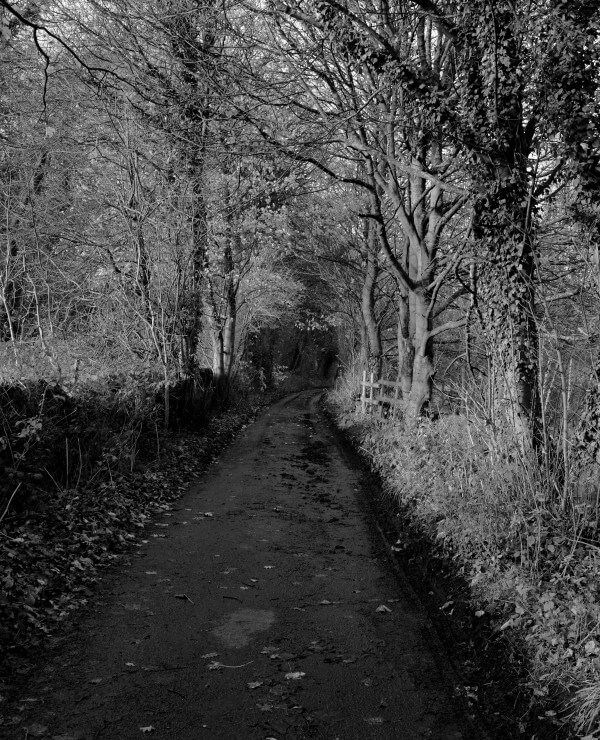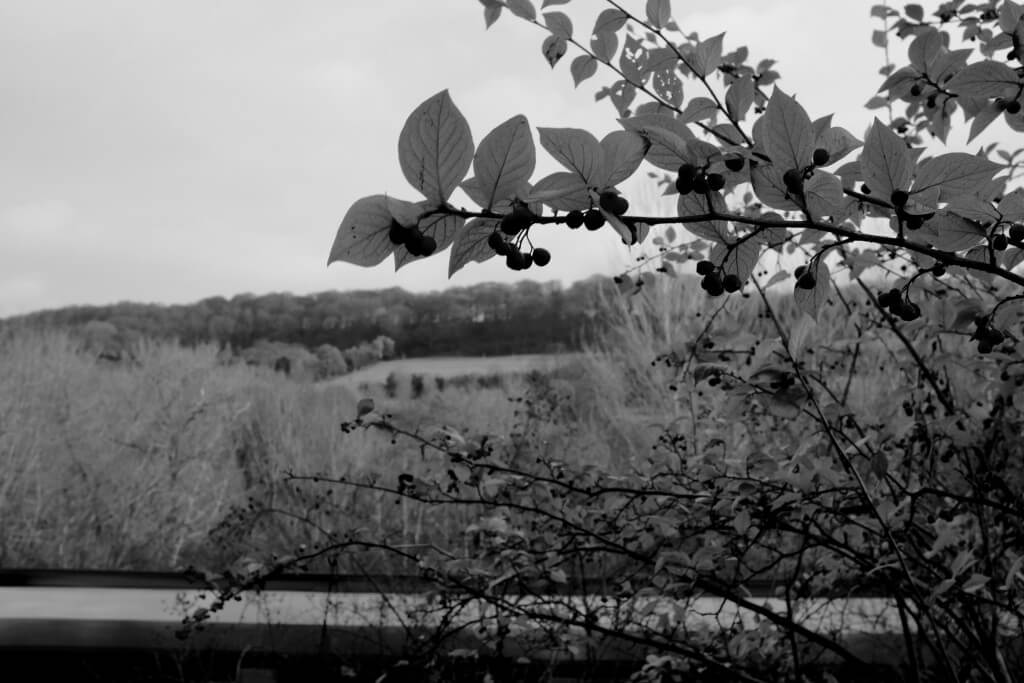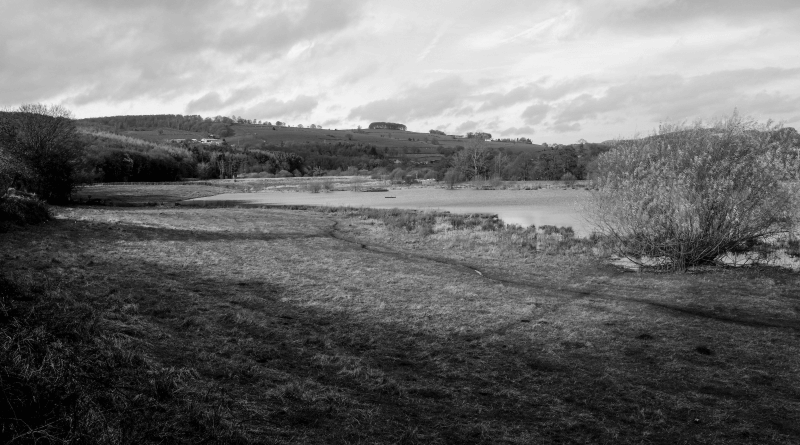THE RIVER’S BRIDE: A Short Story by David Gladwin
Rex sniffed quick the corner-curling wall and pissed in passing, barely pulling on the lead. Colin hummed in his throat at the daily marking and strode along Wyver Lane between the houses and field. Then the gardens grassed down to the Derwent, the houses greybrown in the overcast morning, September’s last. Trees along the river screened the water from view, but in gaps between the River Gardens lay beside the mills across there, tidy but for where the broken tearooms fell to slow decay. Colin felt in his pocket for a mint. From Mount Pleasant each morning they came to walk Wyver Lane’s length and back, two of many, a dogwalker’s favourite. They passed the houses, climbed the road into the shaded stretch, still dark enough, even getting on for eight, in here this morning. Soon he would see one of those who came every day, earlier. Soon.
Briskly uphill Wyver Lane ran treed and bushed, deeper than the fields above along the valleyside. A train clecked past for Matlock and the stations between. Colin stopped to watch, Rex sniffing at the base of a sapling ash. Pulled him on, after the train. Under along the lane now, under sycamore, walls boned with ivy, past hazelpoles, rowan, a beech and old hawthorn, the beautiful treeleaves each rusted and yellowed to ochre and russet and straw. Damp in the air now, here for the duration, gone only when frost gripped its tightest. The stones of the walls either side ran in numberless rows, hodged and piggled, with bracken and nettle behind. Faster now, pacing with Rex ahead, feeling the crest of the lane, the near top of the climb. No trees to the right of them, eastward, the railway just yards from the lane now, railed silent.

Wall became fence on the right, then the big oak where Colin would stop for a fag when he used to smoke. Rex never knew, pulled ahead where old Rosie would stop even if he forgot, years ago. Sandra said don’t get another dog, losing Rosie upset her so much. She’d been Colin’s dog really, he thought, but he worked and that wasn’t the whole of it. Sandra was there on her own all the day. He broke after a fortnight and went for a puppy. She cursed him, fell in love with little Rex, and cried again, all in a minute.
Then a scuffle of boots and paws up ahead brought the first other walker. Barrass came the other way, unconcerned, calling to his Labrador bitch, loose, but he pulled her in to lead, shouted a name at her first, Colin paid no attention. Some people expected Boxers to be nasty, but Rex was soft as a brush. Did as he was told, though. Not like a lot of dogs. Grunts did for greetings between them. Yes, they knew Barrass, as all did who ever went drinking in Belper. Colin liked a pint or two, but his nights of beery heroics were a long way behind him. Not so this one. He didn’t drink in Colin’s pubs, especially not the Nelson, but the stories made their way there, other drinkers like Mikey and Charlie keen to tell him how others supped more than them. That was his purpose, you might say, to drink more than everyone else. The sound of his boots gracked away down to Belper, away.
Out from the trees now and close to the pond, Colin slowing and feeling the valleywind over his face. There by the waterside sulked a grey heron, neck curved back into its shoulders and eyes across the surface, through it, below. They reached their turning point for a weekday, where the lane widened and the signs said Wyver Farm and Wyver Lane Pool. In the circle’s centre they stayed for minutes, watching wishing wanting for a weekend, or a fag, or for a young man’s days to smoke away. Ahead the gentle valleysides spread like legs below an unseen belly somewhere to the north. The heron thrust and flapped across the water, rising slow and strong, trailed droplets afterward and lifted high toward the river. Rex panted and looked up, expectant, but back they bent along the lane, back to the trees, to the walls and the railway, downhill to the houses, to Belper, to Sandra, to work.
Where the wall was low Colin stopped to look across the water, Rex up on hind legs at his side, his companion.
‘There.’ Stroked the dog’s head, feeling tense in his neck the attention, the held-inward bark. ‘What is it,’ asked, ‘rabbits?’ Rex rumbled and rose. Colin wound the lead round his left hand, careful-quiet, in case. Waited. Then he could see, followed Rex’s eye, there in the water upstream a way, floating, a pale shape. Stared, peering wishing he brought his binoculars out on a weekday, resolving to have them next time. He kept sight of the floating thing, moving he thought but the wind-feathered river ran wrong to the eye. You could take it for still, or backrunning, but clearly it ran to the south, to the Trent, to the Humber, the North Sea. It went.
Colin told him to stop and he did, but before that Rex barked twice, significant. Quiet the most of the time, this was not how he acted, not how he behaved. Eyes on the river still, Colin pulled firm on the chokechain and walked them back slow after Barrass and Bess, back for Belper, but stopping to see through the trees if the shape had moved. Out by the gardens again they left shelter for sunlight, weak and little felt under the air. From the top window of the last terraced house, roofed in slate over stone and its windows, the porchway inviting, familiar, called old Mrs Barber, waved at the two, nodding out at the river.
‘You seen that?’ she said. Colin turned to make sure this was that, the same thing, missed her moving away and stood waiting for her to come out from the unchanging doorway.
Wrapped in her housecoat she walked down the path to the gate, always open. Colin wanted to smile, could not.
‘What do you think it is?’ he asked, hopeful.
‘Same as you,’ she said. He waited, but she didn’t say what he’d been thinking, hearing in his eardrums under all the morning’s other sounds. She stared. ‘I knew there must be somethin’ up when I saw you standin’ there.’ She nodded. ‘Come to think, I had a feelin’ last night there were somethin’ wrong. You feel a shudder go all up and down this valley, sometimes.’ Colin felt one himself.
‘Are you sure?’ he said, looking again. He could see how it hung from the surface, how more was unseen. Mrs Barber could see, saw already.
‘I’ll go next door for Janice,’ she said. ‘She’s on the phone.’ Colin stroked Rex’s ear. ‘Better get the police.’ She was only five minutes, but man and dog stood and sat agitated, looking out to the water. The white shape was moving, not fast, but unstopping for the horseshoe weir. Looked back for Mrs Barber. She came out, satisfied.
‘They’re on their way,’ she told him. ‘I couldn’t afford a phone years ago, an’ I’ve nobody to ring up now. Everyone I know lives nearby.’ She was properly old-fashioned, Colin decided. ‘Would you like a cup o’ tea, while we wait?’ No discussion: they would wait. White, he said, no sugar. Rex sat at his feet, eyes on the river. Colin had known Mrs Barber since he was a lad growing up on the Scotches behind, she was like another Auntie. Never knew her husband, he must have died young or something, and she had no children. Spoiled all the local ones though, always had broken biscuits for them, and sometimes warmbaked rock cakes. Could smell and taste them now. Someone started a van along the lane and drove away, too many revs. Colin looked at the clothwhite shape, larger now, rounded perhaps. No-one else had seen, passed without comment. Looked back at the houses, waiting. Remembered how the old girl used to tell them not to point at one another. He’d amended his behaviour even now, a few minutes ago, thirty-odd years later. Never point, she would say: when you do there’s three fingers pointing back. She was a bit funny about things – you had to walk the right way round her kitchen table, for example – but she came running out to help if anyone was hurt, and always gave them a drink of pop on summer days. That was where Colin got his taste for water, not much liking her bitter lemon. Some of the other kids started calling her names as they grew up, but not him. He still waved to her every time he walked past with Rex and stopped to talk when there was anything to say, not that it was ever as weighty as this morning’s subject. Back she came, bustling slow, eyes on the water, two teacups. Her standard expression was narrowed-eyes, watching.
‘In white,’ she said, unsurprised. ‘Like a bride.’ Colin stared, thinking a bride? She kept staring. ‘They often wear white. Maybe they hope inside that someone’s going to see and stop them.’ The tea was good and strong, he wished Sandra would make it like that. ‘Or just that they’ll be found sooner.’ Swallowing fast frowning down at her.
‘Are there many?’ he asked. She shook her head. ‘No, but you remember. I first saw one when I was still a girl, then it were twenty year before the next. She was only seventeen herself, the poor thing.’ The wind brought the sound of the traffic backed up at the Triangle traffic lights. ‘There was one they pulled out alive, who went in just along from here. She was expecting. Terrible. Somebody saw her jump and called for help. Two or three fellers pulled her out, screamin’ an’ cryin’ at ’em to leave her alone. It was a warm night an’ by the time I got along there,’ she nodded, never pointing, ‘the girl was sayin’ as she’d fallen, was angry because she could swim, didn’t need help. She’d been drinkin’, you could smell it. The ambulance came and they took her away. Next day the Bobby were along here asking about it, so I said I thought she’d fallen, been lucky.’ A sup of tea, slurped greedy. ‘They’d only have blamed her. Imagine bein’ that desperate, no bugger helpin’ you until it were almost too late, an’ then callin’ you a criminal. Bloody disgustin’, it is.’ He’d never heard her swear before. ‘Men make the rules, Colin, an’ they make ’em to suit theirselves. It won’t change till there’s more women in charge.’ Never thought of her as a feminist, either. Wondered about her age and if they had suffragettes in Belper, then did the sum and saw she couldn’t be that old. ‘I never knew her name,’ she said, staring at the white shape now evident clear between here and the mills. ‘I don’t know if the child lived, or if she managed it another time. But after that one, and the others, I’ve kept an eye out. I feel it draws ’em in, this river. If they’re minded that way.’

Two police cars, but no lights or sirens. One over in the car park of the River Gardens – they’d take one of the hireboats, of course – and one coming down along Wyver Lane now. Eyes keened on the lifeless white rag, Colin was sure he could see the back of a neck and some hair now, face down and unmoving.
‘I wonder who she was,’ he said as the car stopped and out stepped the officers, everyone looking across at their fellows on the other bank. Mrs. Barber knew without knowing.
‘Somebody’s daughter, or somebody’s mother. Probably somebody’s wife. Even if you’re not alone like me there’s loneliness enough to send you in the water.’ She drained her cup. ‘Bloody river,’ she swore again. ‘Brings us life an’ work an’ everythin’, an’ takes it all away.’ Colin threw the leafy-last drop of his into the grass at the wallside.
‘We can deal with this now,’ said the WPC to Mrs Barber, unresponsive. ‘Someone will come to take your statement.’ Looked then at Rex, didn’t stroke him. ‘Let me have your address,’ she said to Colin. ‘We’ll come to see you, if need be.’ He told her, and when she didn’t insist that he went about his business, he stood again in silence with the old lady as the boat moved across the water.
By David Gladwin


Hugely evocative writing (I love the sense of space and place, and the sound effects – “A train clecked past for Matlock and the stations between”, ” The sound of his boots gracked away”), great use of dialect – puts you right there.
Very complementary photo accompaniment, too.
There’s now a commentary piece about this story at my WordPress blog, along with a competition!
https://dlgladwin.wordpress.com/2016/02/16/commentary-the-rivers-bride/
Like Nick (12th Jan) I delighted in ‘clecked’ and ‘gracked’ (dialect or coined, I wondered). Like the sulking heron this story took off powerfully, in its own good time.
Pleased you enjoyed that, Marion. ‘Clecked’ is onomatopoeic and so is ‘gracked’ although the latter is also a portmanteau word, combining ‘ground’ and ‘cracked’. However a lot of dialect terms do seem to inhabit the space between words, perhaps where a term ought to exist.
I love the earthiness of the words, though am endlessly fascinated by the way some words and phrases flow into gaps, irritating though some may find it (and them). How come ‘no brainer’ ‘deal breaker’ ‘game changer’? The rhythm!
Pingback: Commentary – Pond Life | David Gladwin
Pingback: David Gladwin | The Blue Nib
Trackbacks and pingbacks have been disabled on this article and removed from comments. The URL of the page has been changed. This is because this page alone has generated hundreds of thousands of spam comments. These functions will never be restored to this page. (Editor 15/08/19)